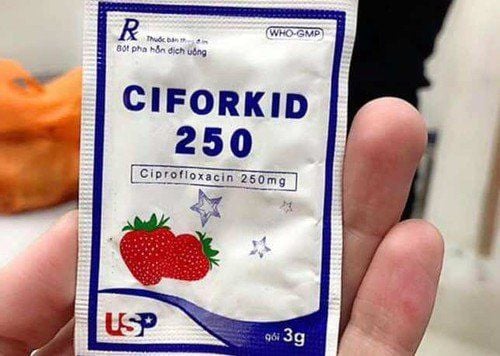This is an automatically translated article.
In our country, intestinal diseases in children such as diarrhea, digestive disorders, constipation... are extremely common and half of them require hospital treatment. Therefore, the problem of the intestinal health of children is what worries many parents. So why is a weak gut in children so common?
1. Explaining the weak intestinal condition in children
Weak intestinal tract in children can cause digestive disorders, this is a very common reaction in children, often related to nutrition and food hygiene. The weak intestinal condition in children is largely due to the fact that the child's body is still very weak, the immune system and digestive organs are still incomplete.
Weak intestines in children can also lead to constipation - one of the top concerns of parents. Constipation causes pain for the baby every time he has a bowel movement, making him afraid to go out, actively holding the stool, leading to the stool mass lying in the intestine for a long time to become larger and harder, causing more pain for the next time. go out next.
Many parents believe that the weak intestinal tract in children originates from the types of milk used by the child. However, according to statistics in pediatric hospitals, the causes and aggravating factors of weak intestinal condition in children stem from unreasonable and unscientific care and rearing.
For example, children with severe constipation are mostly due to misunderstandings of parents and mainly from the psychology of haste or pity for the child. When parents see that their child is constipated, instead of taking their baby to see a doctor to examine their children's intestines, many parents think the cause is milk and immediately change to another type of milk. This treatment will not improve constipation, but may make it worse. Trying to change milk is sometimes not good for your baby because it has the wrong nutritional composition or the fiber content is not enough.
Doctors recommend that as soon as the baby has the first signs of constipation, parents need to take the child to see a doctor to examine the child's intestinal tract, thereby determining the cause and taking measures to treat it. appropriate treatment. In many cases, a child who has a bowel movement only once every 2-3 days is not necessarily constipated. If the stool properties do not change, it is still flexible, not hard, and the baby does not need to push much.
However, prevention is always better than cure. According to pediatric experts, a reasonable diet will help improve the weak intestinal condition in children, especially reduce the risk of constipation and diarrhea. Parents need to let their children drink a lot of water, the daily diet is supplemented with dishes made from fish, sesame, peanuts with green vegetables or soft fruits such as papaya, banana, avocado...
Party In addition, on the market today, there are milk fortified with fiber, supplementing with beneficial bacteria suitable for the weak intestinal condition in children, thereby improving digestion, increasing the absorption of nutrients. nutrients and increase intestinal motility.
Watch now: Prevention of intestinal infections in children

Đường ruột yếu ở trẻ em có thể gây rối loạn tiêu hóa
2. A weak intestinal tract is easy to lead to intestinal infections in children
Intestinal infections in newborns are caused mainly by harmful bacteria entering the baby's digestive system, those bacteria are usually Campylobacter and E.Coli bacteria (Escherichia coli). ). The weak intestinal tract in children is easy to lead to intestinal infections and conversely, intestinal infections are also a factor that makes the intestines weak in children.
Especially during labor and delivery, if hygiene is not ensured, and the sterilization process is not good, pregnant women infected with Campylobacter or Escherichia coli bacteria can completely pass it on to the newborn baby through the nasal organs. mouth... and lead to intestinal infections.
Another factor that increases the risk of intestinal infections in children is the environment around them. If the living environment is not clean, bacteria can be transmitted through items that come into contact with the baby every day such as blankets, pillows, mosquito nets, mosquito nets and especially water sources. If the mother or caregiver does not have good personal hygiene, the process of care and contact can infect the child with bacteria.
Some cases of intestinal infections in children appear during weaning. Usually, 6-month-old babies will enter the weaning phase with new foods such as flour or porridge. Therefore, harmful bacteria have more opportunities to invade the intestinal tract, causing digestive disorders and worse, bacterial infections if parents do not ensure food safety and hygiene in meal preparation.
Symptoms of intestinal infections in children need to be paid special attention to are:
Children cough, runny nose at the same time as children's intestinal infections occur; Poor suckling, anorexia; Children complain of abdominal pain or have abdominal pain; Nausea; May be accompanied by diarrhea. Depending on the condition and weak intestinal characteristics in children of each child, the incubation period for intestinal infections in children will last from 2 to 5 days or 1 to 10 days, so parents need to pay attention to the following signs: symptoms mentioned above to be able to promptly take the child to treatment.
Some measures to prevent children with weak intestinal tract from getting gastrointestinal bacteria:
Keep personal hygiene, keep the living environment around the child clean; Parents or relatives should clean before contact with children; Weaning foods for children with weak intestinal tract need to ensure hygiene; Breastfeed exclusively for the first 6 months of life and continue until 2 years of age; Limit children's contact with patients with respiratory and digestive diseases. A weak gut in children can cause digestive disorders and is often related to nutrition and food hygiene. Therefore, parents need to pay attention to take measures to prevent intestinal infections and protect a healthy digestive system.
In addition, parents also need to pay attention to supplement the necessary micronutrients such as: Selenium, Chromium, Vitamins B1 and B6, Ginger, acerola fruit extract (vitamin C),... Especially biological zinc. to improve the taste, help children eat well, reach the correct height and weight, and exceed the standard, have a good immune system, strengthen resistance to less sickness and less digestive problems.
For more nutritional knowledge and child care for each age, parents should regularly visit the website vimec.com and make an appointment with the leading doctors, pediatric and nutrition experts of the National General Hospital. Vinmec when needing advice on children's health.













